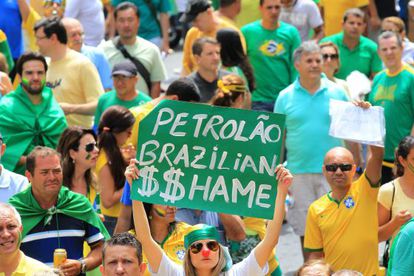Brazilians pour on to streets to protest Rousseff’s policies
The president faces growing calls to deal with corruption and cancel utility rate hikes


At the Faria Lima subway stop in São Paulo, a 50-year-old woman dressed in a yellow Brazil national soccer team jersey holds up a protest sign listing her grievances with the government.
It condemns the corruption scandal at public oil firm Petrobras and the poor state of the economy, and demands that President Dilma Rousseff bears the responsibility.
As she stands quietly next to the ticket window holding her placard, a man about the same age but in poorer clothes approaches her.
“Dilma is not going anywhere because she didn’t steal anything,” he says.
The woman, Liliana, a psychologist, does not answer and keeps holding up her sign in a show of defiance.
“Dilma has lied to us,” she explains. “She paints a rosy picture of the country when she speaks on television. She said one thing during her campaign and now says another. Taxes and energy bills are soaring, the public education system, transport – everything – continues to be bad. I would like to live in a country she describes.
“I am not calling for her impeachment but I would like her to start telling people the truth,” she states.
A few minutes later, Liliana rolls up her sign and joins a sea of demonstrators marching in an anti-government protest along Avenida Paulista in the heart of the financial district.
According to police estimates, one million people came out in São Paulo on Sunday to protest Rousseff’s administration and the ruling Workers’ Party (PT), whose members are embroiled in the corruption investigation into kickbacks that took place at state oil firm Petrobras.
She paints a rosy picture of the country when she speaks on television ”
But A Folha de São Paulo newspaper put that figure at around 210,000.
Many chanted “Get out Dilma” as they walked along the skyscraper-lined avenue.
Similar demonstrations were held in other towns and cities across Brazil.
Most of those who took part in the protests and called for Rousseff’s resignation belong to the country’s wealthier classes – doctors, teachers, business owners and students – who have traditionally voted against the PT.
The majority of the protestors wore the canary-yellow-and-green jerseys of the national soccer team and carried the Brazilian flag. Among their gripes are the threat of a possible recession, higher taxes, public spending cuts, and utility bill hikes.
“During her speech last Sunday, Rousseff blamed the crisis on other countries and didn’t assume any responsibility for the corruption,” says José Arménio, a 35-year-old surgical supplies salesman.
Rousseff made fools out of us and we will have none of that”
“She said spending cuts were needed when during her campaign she never mentioned them. She made fools of all us and we will have none of that,” he says.
Rousseff, who was elected to a second term last year after winning a close race, finds herself having to deal with a widespread graft inquiry into Petrobras, which has engulfed ruling party leaders. Brazil’s attorney general believes that Petrobras contractors paid kickbacks to corrupt oil company executives and some PT members.
Rousseff served as energy minister and oversaw Petrobras’s operations during President Luiz Inácio Lula da Silva’s administration, which protestors say put her at the heart of the scandal. But the country's top prosecutor has decided not to charge her in the case.
Yet Sunday’s highly successful march puts the ball in the government’s court. While the possibility of an impeachment process seems remote – few leaders favor putting Rousseff on trial because of legal and political reasons – the growing social rejection of Rousseff’s policies comes as she begins her second term in office.
With the economy stagnating and corruption rampant, which have emboldened many in the opposition in Congress to wage a dirty war against the government, Rousseff now faces a new battlefront with the street protests, which are only expected to grow.











































